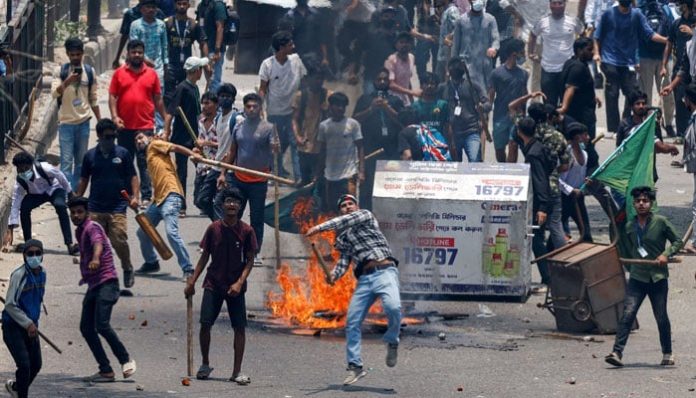DNA
Television news channels in Bangladesh went off air as violent student protests continued on Friday against quotas for government jobs in which nearly two dozen people have been killed this week.
There was fresh violence in some parts of the country on Friday and police were using tear gas to disperse protesters, a witness said.
Prime Minister Sheikh Hasina’s government “was forced” to call in the army late on Thursday to help “maintain order”, India’s Economic Times newspaper reported.
Although the protests were sparked by student anger against the controversial quota system, some analysts have said that tough economic conditions, including high inflation, rising unemployment and depleting foreign reserves, were providing fuel to the fire, Reuters reported.
The protests have also opened old and sensitive political faultlines between those who fought for Bangladesh’s war in 1971.
Authorities had cut some mobile services on Thursday to try to quell the unrest but the disruption spread across the country on Friday morning, witnesses in Dhaka and New Delhi said.
Telephone calls from overseas were mostly not getting connected and calls through the internet could not be completed.
Websites of several Bangladesh-based newspapers were not updating on Friday morning and their social media handles were also not active.
News television channels and state broadcaster BTV were off the air while entertainment channels continued normal transmission, a witness said.
Websites hacked
Streets in the capital Dhaka were deserted on Friday, which is a weekly holiday in the country.
There was little traffic and very few rickshaw pullers on the streets and thin crowds near a vegetable and fish market, he said, adding that a protest rally had been called at the main mosque at around 0800 GMT.
The official web sites of the Bangladesh central bank, the prime minister’s office and police appeared to have been hacked by a group calling itself “THE R3SISTANC3”, which said: “It’s not a protest anymore, it’s a war now.”
The nationwide agitation, the biggest since Hasina was re-elected earlier this year, has been fuelled by high youth unemployment. Nearly a fifth of the country’s 170 million population is out of work or education.
Hasina’s government had scrapped the quota system in 2018, but a high court reinstated it last month. The government appealed against the verdict and the Supreme Court suspended the high court order, pending hearing the government’s appeal on August 7.

















